Russian President Vladimir Putin has told former U.S. President Donald Trump that Moscow will respond to Ukraine’s recent drone attacks on Russian airbases, according to Trump.
Following a phone call between the two leaders, Trump said: “President Putin did say, and very strongly, that he will have to respond to the recent attack on the airfields.” The call reportedly lasted over an hour.
Russian officials have not confirmed Putin’s warning publicly. However, earlier statements from Moscow indicated that military responses were “on the table.”
Trump warned on social media that the phone call would not result in immediate peace between Russia and Ukraine. He added that resolving the conflict would require more time and effort.
Russia’s state-owned RIA Novosti news agency reported that Putin accused Ukraine of trying to disrupt peace negotiations and claimed Kyiv’s government had “essentially turned into a terrorist organization.”
Despite the strong language, the two leaders also reportedly discussed the possibility of future cooperation between their countries. RIA said both expressed hope that ties could eventually be restored.
This marks the first known conversation between Trump and Putin since Ukraine launched a surprise drone attack on June 1. The strike targeted Russian airbases housing nuclear-capable long-range bombers.
Russian presidential aide Yury Ushakov said Trump told Putin that the United States had no prior knowledge of Ukraine’s drone operation.
Ukraine’s Minister of Strategic Industries, Yuriy Sak, told the BBC’s World Tonight program that his country hoped the U.S. would respond to ongoing Russian drone and missile strikes with increased sanctions and international pressure.
Trump recently criticized Putin’s war strategy. On May 26, he said Putin had “gone absolutely crazy” and was “playing with fire” after Russian missile strikes killed dozens of civilians in Ukraine.
In Wednesday’s statement on his Truth Social platform, Trump did not repeat earlier threats to reassess U.S. policy if Putin appeared to stall peace efforts. He had previously suggested he would wait only two weeks before making changes.
Ukrainian President Volodymyr Zelensky responded on X, warning that weak global reactions to Putin’s threats could encourage further aggression. “Many have spoken with Russia at various levels. But none of these talks have brought a reliable peace,” he said.
On the same day, top Ukrainian officials, including Deputy Prime Minister Yulia Svyrydenko and Presidential Office head Andriy Yermak, traveled to Washington to meet with U.S. senators. Discussions focused on defense support, battlefield conditions, sanctions, and a reconstruction fund.
The visit followed a second round of direct peace talks between Ukraine and Russia in Istanbul. While no breakthrough was reached, both sides agreed to another prisoner swap.
Ukrainian negotiators said Russia rejected a call for an unconditional ceasefire—a key demand from Kyiv and Western allies. Russia offered temporary ceasefires in some frontline areas but provided few details.
Despite ongoing fighting, Trump has repeatedly said he believes both sides are making progress toward peace.
Separately on Wednesday, Putin held a phone call with U.S.-born Pope Leo XIV. The Vatican confirmed that the war in Ukraine was a central topic of the discussion.
Trump and Putin also discussed Iran’s nuclear ambitions. Trump said both agreed that Iran should not be allowed to obtain a nuclear weapon. The U.S. reportedly proposed that Iran stop enriching uranium and instead use a regional supply group for its nuclear fuel needs.
Iran has not responded to the proposal. However, its Supreme Leader Ayatollah Ali Khamenei has rejected similar suggestions in the past and insisted Iran will continue enriching uranium.
Trump said he believes Iran is delaying its decision and urged a swift resolution. “We will need a definitive answer in a very short period of time,” he wrote.


